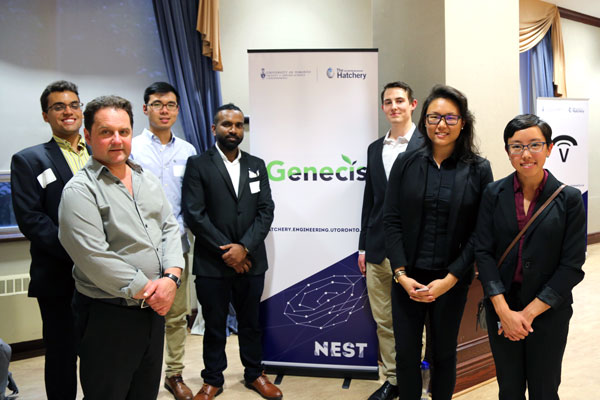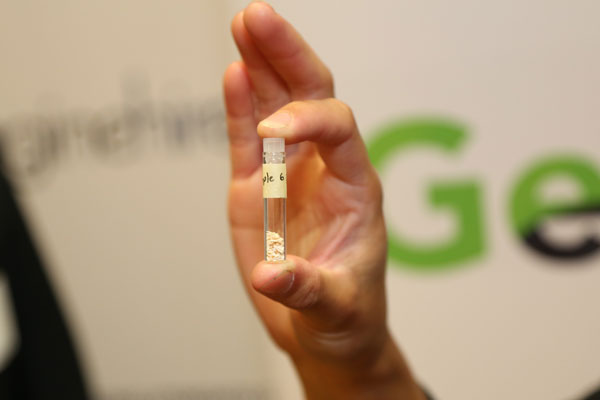
Tyler Irving
September 14, 2017
Startups founded by engineering students are poised to address challenges from sustainability to surgery. Twelve companies pitched their vision to a room of judges, investors and faculty members at the fifth annual Hatchery Demo Day, held September 6 at U of T Engineering.
“Five years after we founded the Hatchery, the spirit of entrepreneurship continues to be the engine of all that we do,” said Joseph Orozco, executive director of The Entrepreneurship Hatchery, in his opening remarks. “We nurture the mindset for entrepreneurial thinking, and we have seeded the ideas that I believe will transform our society. Together, we are building the Canada of tomorrow.”
Demo Day is the culmination of The Hatchery Nest program, a four-month accelerator which pairs student teams with experienced mentors — including executives, lawyers, medical professionals and engineers — to develop their businesses. They receive detailed feedback on their business plans, explore their proposed market, learn about patents and marketing and build prototypes using 3D printers and other fabrication resources. A second Hatchery program, Hatchery Launch Lab, focuses on supporting startups built on graduate-level research in the Faculty.
Of the dozen teams that presented at Demo Day 2017, four took home a share of $42,500 in seed funding. A student from The Edward S. Rogers Sr. Department of Electrical & Computer Engineering (ECE), Robert Fairley (Year 3 ECE), was a member of Genecis, the startup that received the $20,000 grand prize, donated by alumnus Anthony Lacavera (CompE 9T7), founder and chairman of Globalive Holdings and former CEO of WIND Mobile. An additional $2,500 Orozco prize is provided through funds raised by the students themselves.
$20,000 Lacavera Prize: Genecis — From food waste to renewable bioplastics

Restaurants throw away a lot of food, and that costs money. In fact, large-chain, full-service restaurants can pay tens of thousands of dollars each year just to dispose of their food waste in landfills. Genecis has a solution that is both greener and less costly.
“We turn restaurant food waste into bioplastics,” said Luna Yu, Founder and CEO of Genecis. “We make money from both the collection fees we charge to the restaurants, and from the bioplastics and compost we produce from them.”
The ‘secret sauce’ of Genecis is two different cultures of microorganisms. One breaks down leftover food into energy; the other uses this energy to grow and accumulate substances called polyhydroxyalkanoates, or PHAs. PHAs are a type of biodegradable plastic, and can be made into products such as thin-film packaging or bottles.
Because they are recovering value from food waste, Genecis believes they will be able to charge lower collection fees than typical waste disposal companies, while enabling restaurant owners to feel good about where their waste goes. The company has done extensive testing in the lab, and the funding they earned at Hatchery Demo Day will enable them to build a 1,000-litre pilot bioreactor to test the process at a larger scale.
“The Hatchery really helped us hone our business models and point us in the right direction in terms of what we should focus on,” said Yu. “I honestly don’t think we would be in the position we are today without them.”
See the complete list of “Startups to Watch” from U of T Engineering.
This story originally appeared on U of T Engineering News.
More information:
Jessica MacInnis
Senior Communications Officer
The Edward S. Rogers Sr. Department of Electrical & Computer Engineering
416-978-7997; jessica.macinnis@utoronto.ca